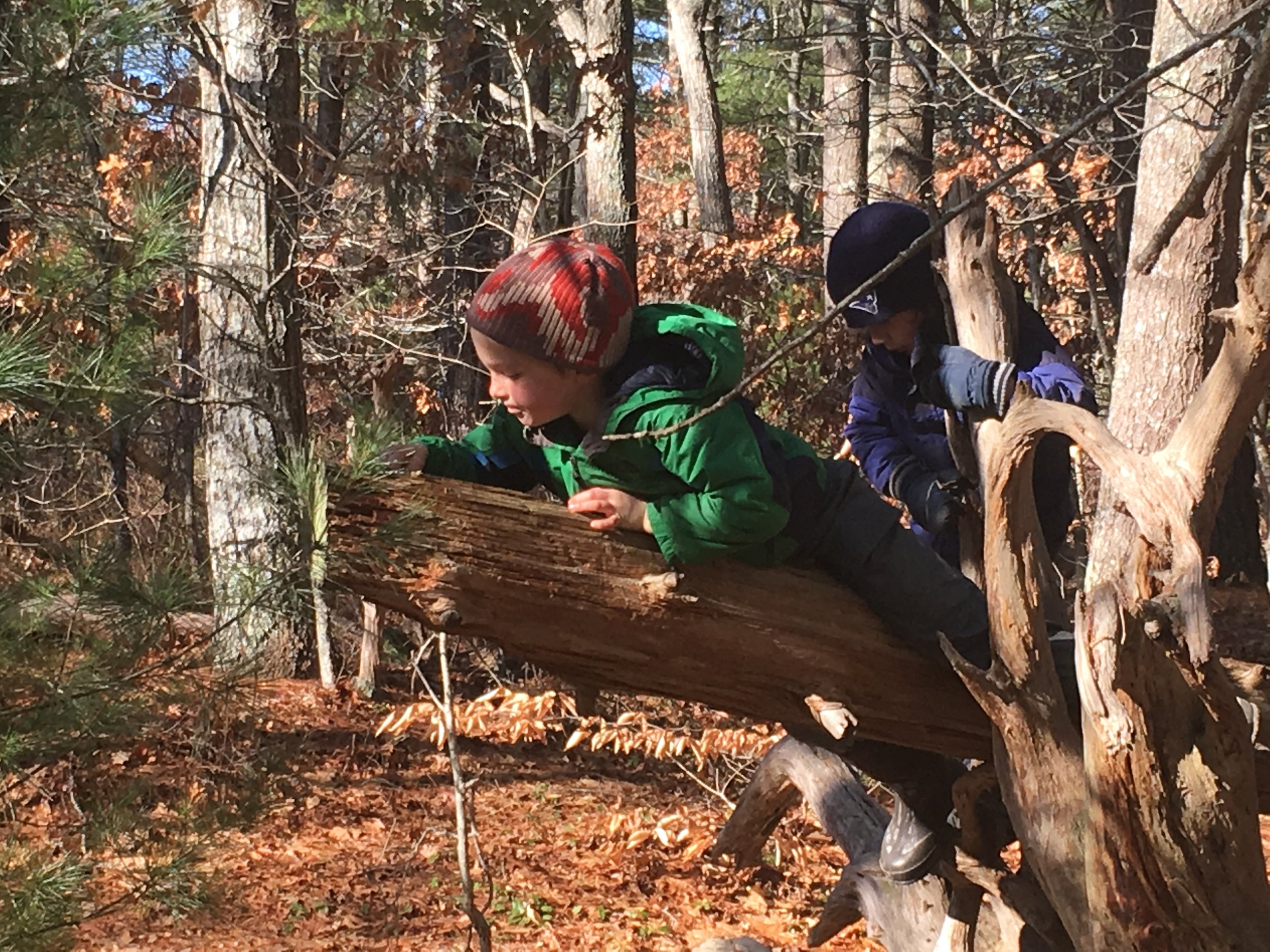by Nancy Garvey, M.Ed
Many people are pleasantly surprised to learn that Waldorf students spend a great deal of time outdoors. While this is especially true of Waldorf nursery and kindergarten programs, all the classes at Waldorf schools through the grades are outside each day as part of the curriculum.
Cultivates Creativity
There are many reasons to bring children out into nature including to give them an opportunity to play with “natural toys” such as sticks, pine cones, sea shells and tree bark, an opportunity to breathe fresh air, witness the marvels of the natural world, increase the child’s power of observation and to calm them and to work out extra energy.
Waldorf teachers in early childhood and elementary grades offer both indoor and outdoor free play time. Free play is play that is not directly lead or organized by an adult or caregiver. When children spend time outdoors, without toys or electronic gadgets, they find creative things to do utilizing the natural “toys” around them. This fosters creative imagination.
Builds Physical Resilience
When children are left free to create, it is remarkable to witness the elaborate macro-structures they build, such as debris shelters, teepees, and boats using fallen tree branches and tree limbs found in the woods. These creations are large enough for whole classes to be inside and explore. When they build with fallen trees or limbs, the children are using gross-motor movements and muscles, are working hard and are generally in collaboration with classmates, which fosters communication, flexibility in thinking, teamwork and problem solving. One of the benefits of this type of hard work is that it build “will-forces”, the ability to “stick with it” when faced with challenges, a skill that serves our students for the rest of their lives.
Many students have also built tiny gnome homes or gnome villages at the base of trees. Building small structures utilizes fine motor skills and provides opportunities for children to imagine more intently by pretending that they are entering a fairy world and a magical realm.
Strengthens physical and mental health
Breathing fresh air, especially in a forest or by a beach, has health benefits. In the article entitled “Here's Why a Walk in The Woods or a Dip in The Ocean Is So Great For Your Health”, authors Jeffrey Craig and Susan L.Prescott explain that we breathe in beneficial bacteria, plant-derived essential oils and negatively-charged ions, ions which may influence mental outlook in beneficial ways, whenever we are in forests or by bodies of water, which increases our physical and mental well-being. They even went so far as to say, “There is increasing evidence that we can help shape our children’s mental and physical health by exposing them to more green environments as they work, rest and play.”
Any teacher who has spent time with their students in the woods will tell you that there is something healing about being in nature and that aggressive, anxious children are calmed after even a brief time in a forest or at the beach, or on a long walk.
Learn Through Observation
We want to help our children become observers because seeing is one way people learn. Being in nature provides children, (and adults), wonderful opportunities to pay attention and to notice. When children discover something for themselves, it is amazing and memorable. Once, in the woods across the street from our school, a five year old girl noticed, for the first time ever, that leaves have veins. She was very much pleasantly astonished and in awe. Witnessing her pleasure and amazement was also a gift for me that I will never forget.
When children often spend time in nature, they begin to notice changes in their surrounds that happen with the change of seasons, for example, or the change in light depending on the time of day or angle of the sun. It is truly a magical experience to observe a child who spies a dew-covered spider web catching the early rays of the sun or who is so moved upon finding a tiny, young salamander, they weep.
Nature has a Calming Effect on Children (and Adults)
Natural environments offer us a chance to relax and recover from noise and to witness the awe of nature and witness beauty. When my boys were young, we went for a walk in the woods everyday, partly for their benefit and partly for mine (to use some of their exuberant energy in a positive way), because if they did not have the opportunity to move and work their bodies, they were very rambunctious and got into trouble.
We never knew what gift we would come upon in the forest, but we discovered something every time. My sons are grown men now. However, they still remember the day we found wild cranberries growing along the bank of the river near our house, the time we were in the woods when it started to snow and, because we were quiet, we actually heard the snow flakes landing on the ground. Another fond memory is the day we were hiking on a path, turned the corner and saw two young fox kits frolicking in the sunshine. These are truly memorable parts of their lives and would not have been possible had we not spent time outside in nature everyday.
Many Waldorf early childhood classes begin the day with time outside, and some schools have added a “Nature Kindergarten” or “Forest Kindergarten”. Starting the day outside allows the children, especially the boys who are more often diagnosed as hyperactive, to use up some of their excess energy and to feel settled within their bodies. When these classes then go inside, the children seem more comfortable focusing on the tasks at hand.
There are many benefits to being in nature. Rachel Carlson, in Silent Spring stated, "Those who contemplate the beauty of the earth find reserves of strength that will endure as long as life lasts. ... There is something infinitely healing in the repeated refrains of nature - the assurance that dawn comes after night, and spring after winter." My advice is to spend time in nature with children. It will do them, and you, some good. So go for a walk, take a hike or swim in a river, pond or ocean and notice the benefits of being outdoors.
If you are interested in learning more about our school and would like to schedule a visit please contact Roxanne King at rking@waldorfcapecod.org





